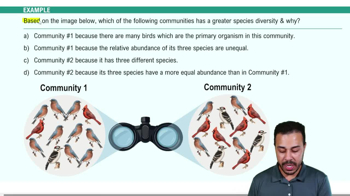Community Structure quiz Flashcards
 Back
BackCommunity Structure quiz
1/15
Terms in this set (15)
- What are the four key components of community structure?Species richness, relative abundance, species interactions, and physical aspects of the community.
- How is species richness defined?Species richness is the number of different species in a community.
- What does relative abundance measure in a community?Relative abundance measures the number of individuals of a particular species relative to others in the community.
- What is species diversity and why is it important?Species diversity is a measure that takes into account both species richness and relative abundance, and it leads to greater biomass production and resistance to invasive species.
- What is a trophic structure?Trophic structure is the transfer of energy through trophic levels, often expressed in a food chain or food web.
- What is the 10% rule in trophic levels?The 10% rule states that only about 10% of the energy is transferred from one trophic level to the next.
- What is the difference between a food chain and a food web?A food chain is a linear network of organisms showing who eats whom, while a food web is a more complex network of interconnections between organisms.
- What are bottom-up and top-down models in community structure?Bottom-up models focus on the influence of lower trophic levels on higher levels, while top-down models show how predators control community structure by limiting herbivores.
- What is a keystone species?A keystone species has a significant effect on its community despite not being the most abundant.
- What role do ecosystem engineers play in a community?Ecosystem engineers significantly modify or maintain their habitat, like beavers creating dams.
- What is a disturbance regime?A disturbance regime is a recurring pattern of disturbances that a community experiences.
- What does the intermediate disturbance hypothesis state?The intermediate disturbance hypothesis states that moderate levels of disturbance lead to greater species diversity.
- What is primary succession?Primary succession is the colonization of new or barren areas by pioneer species, leading to soil development and subsequent species.
- How does latitude affect species diversity?Latitude affects species diversity through differences in climate, sunlight, and precipitation, with the tropics having high species diversity due to ample sunlight and precipitation.
- What is the island equilibrium model?The island equilibrium model looks at the balance between species immigration and extinction rates to maintain stable species counts on an island.



